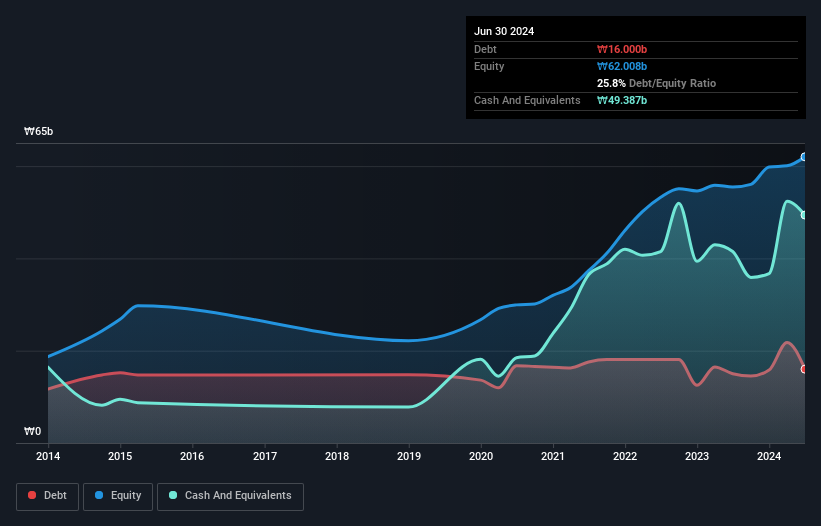- South Korea
- /
- Semiconductors
- /
- KOSDAQ:A089790
These 4 Measures Indicate That JT (KOSDAQ:089790) Is Using Debt Safely
David Iben put it well when he said, 'Volatility is not a risk we care about. What we care about is avoiding the permanent loss of capital.' When we think about how risky a company is, we always like to look at its use of debt, since debt overload can lead to ruin. As with many other companies JT Corporation (KOSDAQ:089790) makes use of debt. But should shareholders be worried about its use of debt?
When Is Debt Dangerous?
Generally speaking, debt only becomes a real problem when a company can't easily pay it off, either by raising capital or with its own cash flow. If things get really bad, the lenders can take control of the business. However, a more usual (but still expensive) situation is where a company must dilute shareholders at a cheap share price simply to get debt under control. Of course, the upside of debt is that it often represents cheap capital, especially when it replaces dilution in a company with the ability to reinvest at high rates of return. When we think about a company's use of debt, we first look at cash and debt together.
See our latest analysis for JT
How Much Debt Does JT Carry?
You can click the graphic below for the historical numbers, but it shows that as of June 2024 JT had ₩16.0b of debt, an increase on ₩15.0b, over one year. However, its balance sheet shows it holds ₩49.4b in cash, so it actually has ₩33.4b net cash.

How Strong Is JT's Balance Sheet?
According to the last reported balance sheet, JT had liabilities of ₩24.2b due within 12 months, and liabilities of ₩147.2m due beyond 12 months. Offsetting these obligations, it had cash of ₩49.4b as well as receivables valued at ₩8.72b due within 12 months. So it actually has ₩33.8b more liquid assets than total liabilities.
This surplus strongly suggests that JT has a rock-solid balance sheet (and the debt is of no concern whatsoever). On this view, lenders should feel as safe as the beloved of a black-belt karate master. Succinctly put, JT boasts net cash, so it's fair to say it does not have a heavy debt load!
The modesty of its debt load may become crucial for JT if management cannot prevent a repeat of the 62% cut to EBIT over the last year. When a company sees its earnings tank, it can sometimes find its relationships with its lenders turn sour. When analysing debt levels, the balance sheet is the obvious place to start. But it is JT's earnings that will influence how the balance sheet holds up in the future. So when considering debt, it's definitely worth looking at the earnings trend. Click here for an interactive snapshot.
Finally, while the tax-man may adore accounting profits, lenders only accept cold hard cash. JT may have net cash on the balance sheet, but it is still interesting to look at how well the business converts its earnings before interest and tax (EBIT) to free cash flow, because that will influence both its need for, and its capacity to manage debt. During the last three years, JT generated free cash flow amounting to a very robust 83% of its EBIT, more than we'd expect. That positions it well to pay down debt if desirable to do so.
Summing Up
While it is always sensible to investigate a company's debt, in this case JT has ₩33.4b in net cash and a decent-looking balance sheet. And it impressed us with free cash flow of ₩4.7b, being 83% of its EBIT. So is JT's debt a risk? It doesn't seem so to us. When analysing debt levels, the balance sheet is the obvious place to start. However, not all investment risk resides within the balance sheet - far from it. For example, we've discovered 1 warning sign for JT that you should be aware of before investing here.
At the end of the day, it's often better to focus on companies that are free from net debt. You can access our special list of such companies (all with a track record of profit growth). It's free.
New: Manage All Your Stock Portfolios in One Place
We've created the ultimate portfolio companion for stock investors, and it's free.
• Connect an unlimited number of Portfolios and see your total in one currency
• Be alerted to new Warning Signs or Risks via email or mobile
• Track the Fair Value of your stocks
Have feedback on this article? Concerned about the content? Get in touch with us directly. Alternatively, email editorial-team (at) simplywallst.com.
This article by Simply Wall St is general in nature. We provide commentary based on historical data and analyst forecasts only using an unbiased methodology and our articles are not intended to be financial advice. It does not constitute a recommendation to buy or sell any stock, and does not take account of your objectives, or your financial situation. We aim to bring you long-term focused analysis driven by fundamental data. Note that our analysis may not factor in the latest price-sensitive company announcements or qualitative material. Simply Wall St has no position in any stocks mentioned.
About KOSDAQ:A089790
JT
Engages in the research, development, and sale of semiconductor process and automation equipment in South Korea and internationally.
Adequate balance sheet with low risk.
Market Insights
Community Narratives



